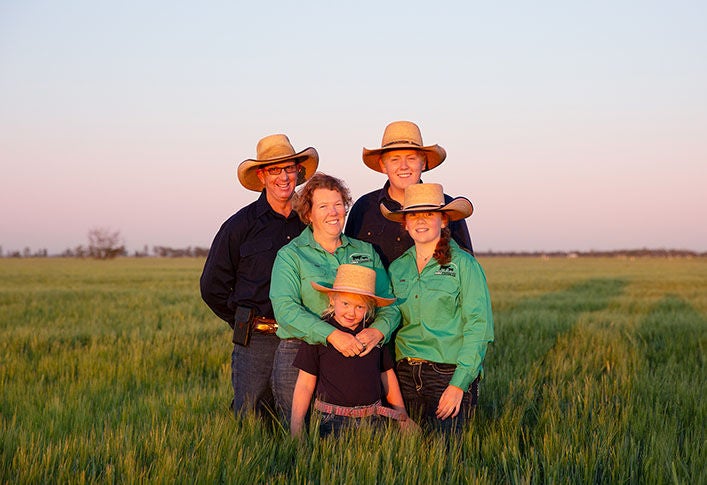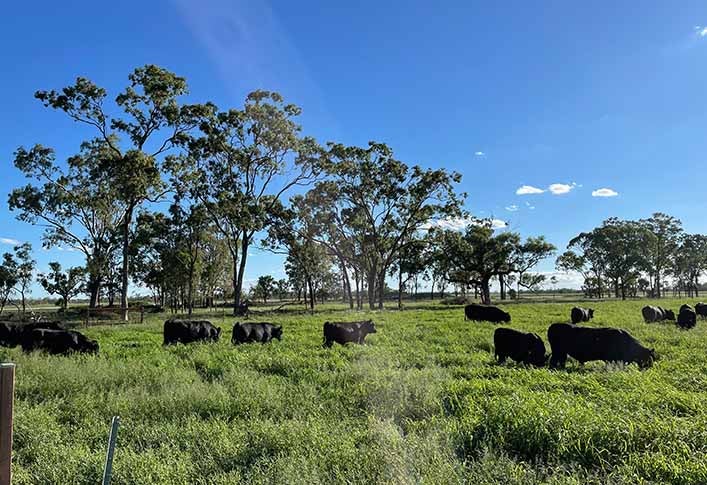Posted by on
19/07/2022
Australia’s capacity to provide healthy food, ethically, is the source of great pride for Warren and Megan Salter, to the point that this Dalby couple has completely overhauled its operation.
Despite over 20 years of intensive and conventional farming and grazing experience behind them, in recent years Warren and Meg have refocussed their operation towards more holistic practices to provide a product that benefits the consumer, their business and the environment.
“Commodities are always going to face seasonal and market challenges, yet I have confidence in Australia’s strengthening outlook based on our superiority providing food that consumers feel good about eating.”
Certainly, the Angus beef raised on the Salter’s property is 100 per cent naturally produced, with animal welfare and positive environmental outcomes at the core of their business.
Meg, a vet, develops and oversees the herd health programs, ensuring their integrity and the wellbeing of the cattle. Programs are also developed to ensure environmental outcomes match the values of the Salter family.
“Personally, I don’t like going down to the river without aero guard, so I don’t expect our cattle to stand around getting eaten by mosquitos or irritated by flies, and any products we use are all part of our highly considered welfare program,” Warren said.
Farming for the Future
Formerly in the feed lotting business, Warren and Meg sold out of what had been their long-term business partnership to focus on their own farming and grazing interest, based on their Mt Pleasant property near Dalby.
They also purchased additional adjoining properties in 2019/20 to realise their long-held vision.
“We made a decision that we want to leave our land and environment in a more reliably productive state, focussing on the wellbeing of all environmental factors such as soil, water and stock welfare.”
With three children Charlie, 18, Matilda, 16 and Jessie, eight, Warren said the operation was a family affair, with the young ones all invested in the principles and practices implemented across the farm.
“They’re our next generation of farmers, and our true vision is to hand it on to them, through whatever succession structure that may be, in a better and more productive capacity than it is today.”
With a conventional farming and grazing background, the Salters had first-hand experience in drought, increased costs related to conventional only farming and grazing management practices, and how these factors had all contributed to poor soil health and environmental conditions that had challenged their crop productivity, long-term grazing outcomes and financial position.
“Considering the costs of artificial input prices, it was a losing battle, the costs really crunch the profits, so now our focus is decreasing our use of artificial chemical and fertiliser inputs to help manage costs, and lift our soil health by retaining moisture and promoting microbial activity in the soil.”
Shifting strategy
Running over 1,000 hectares, the property is split between a grazing and cropping enterprise, which includes seasonal cereals, predominantly grown as cash crops.
Lately Warren has begun converting the more marginal farming land into multi species pastures consisting perennial grasses and legumes such as Leucaena, medic and vetches.
“We are always looking for ways to improve what we do, reading, listening and learning. At the moment we’re making it up as we go, our decisions based on our understanding of the best pathway to achieve our goals. We have been including a mix of four or five grass species as well as summer and winter legumes depending on the soil types,” Warren said.
“We’ve been growing these pastures for the past three years with an aim to increase our soil biology and carbon and provide a nutritionally dense, natural grazing option for our cattle, and we’re really pleased with the response.”
“As they say, all education has a cost – we’re learning as we go and so far the benefits are outweighing the costs.”
Pastures also ensure the family is ‘working with mother nature and the lay of the land’, helping repair a landscape degraded by erosion and improve outcomes on their flood plains.
“For any extensive grazing operation in Australia the key is to ensure the landscape can manage its way through drought, and these measures are helping maintain groundcover, moisture and ultimately soil carbon and resilience come the next dry spell.”
Taking stock of animal welfare
The Salter’s beef operation includes a 250 Angus stud herd and a commercial backgrounding herd.
All cattle within their operation are grass fed, and tended with the utmost care – answering Australian consumers’ call for ethically produced beef, whilst also opening up broader marketing opportunities for their business.
“We have a welfare story, a carbon story and a traceability story that underpins our beef production, and we’re looking to capitalise on that,” Warren said.
“We are currently looking to supplying our product to a branded beef operation in a further contribution to industry transparency, whilst receiving premium pricing for our efforts, it’s the ultimate win/win,” Warren said.

Innovation drives efficiency
An operational ‘game changer’ has been the inclusion of a walk-over weigh bridge (WOW), a portable weigh bridge with data collection capabilities that Warren believes has improved their grazing management ‘ten-fold’.
“We discovered the concept over five years ago when it was just an engineering thought bubble, and partnered with the manufacturers, providing a test site for trial work,” Warren explained.
A weigh deck and drafting unit in one, the portable innovation is placed in high traffic locations, enabling cattle to be automatically weighed regularly with the least amount on physical input required.
In the case of the Salters, they have two WOW units operating, with cattle traffic now entering watering points through the units, with electric tape used to cordon off the zone.
“I’d describe Meg and I as ‘positive data people’, we follow the principle that if you can’t measure it, you can’t improve it,” Warren said. “As such, we are always looking at systems and processes to streamline the way we go about daily life, and this software and cattle handling facility has proven invaluable.”
The WOW unit scans each beast via its individual NLIS tag, with cloud software calculating the herd’s average weight and average daily weight gain, which can be accessed from a mobile phone.
“I have a commercial group of 219 head, and each day I can reconcile that number, which is in itself an extremely valuable tool for helping identify if a beast is not drinking and potentially ill or visiting neighbours.”
“On my phone I can also see the bulk summary of weights, and from my computer there is even greater software functionality, with access to individual daily weight gain and weight history.”
Monitoring the daily performance of his cattle has also provided Warren and Meg with insights into their grazing operation, and how to optimise grazing days per hectare through data-based decision making.
“We follow a time-controlled rotation grazing schedule basing our grazing decisions on the growth rates of the plants and the cattle performance. Previously cattle were moved approximately every eight weeks based on my rough visual guestimate.”
“I’d use my shin as the benchmark, and when the pastures got low enough, I’d move the cattle on and give myself a pat on the back,” Warren chuckled.
“Now our grazing management has improved significantly thanks to the precise data I can now access, I can identify the exact point that cattle are putting on less weight, and know it’s time to move them on.”
Overall, he said, dividing paddocks using electric fences and moving cattle between paddocks every two weeks is four to six weeks earlier than previously practiced – which ensures each individual animal’s daily weigh gain performance is maintained.
“Gains may reduce per day however we don’t want to see a loss!” Warren said. “We budget an average of one kilogram of weight gain per day, and consider anything less than the budget a loss.
This increased data collection ensures all paddocks and pastures are not overgrazed and have adequate rest time allocated, Warren said.
Animal welfare and labour-saving win
The Salter’s permanent weigh-in station is up to ten kilometres from their paddocks, with the physical labour necessary to move and weigh each cow – plus the welfare concerns moving cattle that distance each day – rendering daily weight collection unviable without this system.
Warren stressed it was simply not an option.
Even weekly weigh-ins required significant labour resources.
“There is just no way you could collect that data manually and its success was a real ‘shake-up’ moment for us,” Warren admits.
The innovation has built increased profitability into the business through physical labour savings, improved animal performance, and enabled better management decisions based on current data.
Warren said, from a management perspective it’s been extremely reassuring when he and Meg are not onsite to access and monitor cattle movements and water points remotely.
“Cattle all learn as weaners how to use the WOW, and they learn quickly so it’s a really streamlined process without the need for any extra handling – our greatest challenge is that the cattle often like to have a camp on and around the weighbridge while they’re there!”
Whilst their holistic farming and grazing journey is only in the early stages, Warren said knowledge sharing and ‘learning smarter ways from others in the industry to better manage our land and business’ was a priority.
“It’s an exciting time for us – as a family, as farmers and as land custodians – and this is just the beginning of a really rewarding path.”
Photo Credit: Felicity Broadbent from First Impressions
